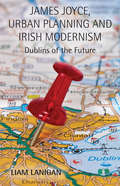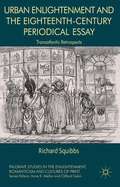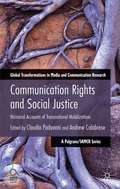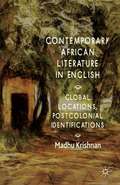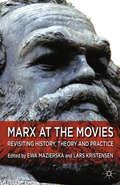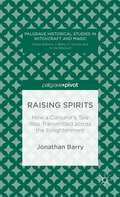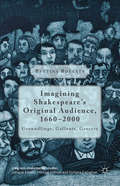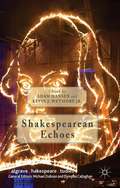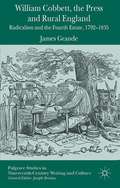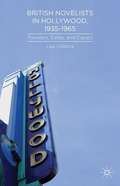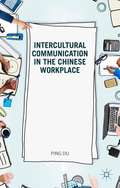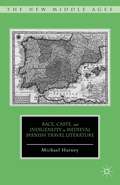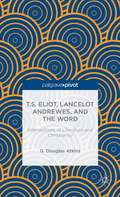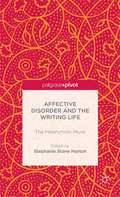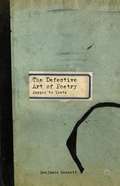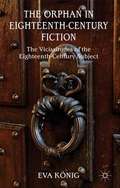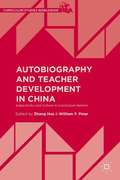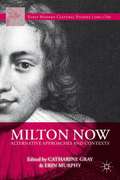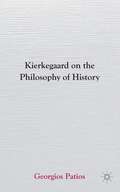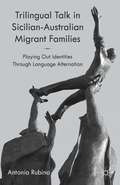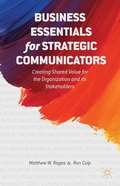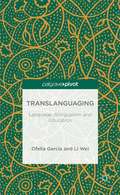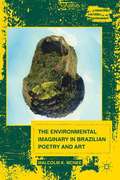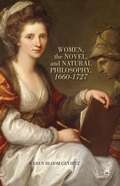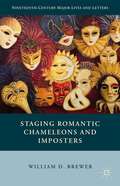- Table View
- List View
James Joyce, Urban Planning and Irish Modernism: Dublins of the Future
by L. LaniganIrish writing in the modernist era is often regarded as a largely rural affair, engaging with the city in fleeting, often disparaging ways, with Joyce cast as a defiant exception. This book shows how an urban modernist tradition, responsive to the particular political, social, and cultural conditions of Dublin, emerged in Ireland at this time.
Urban Enlightenment and the Eighteenth-Century Periodical Essay
by Richard SquibbsUrban Enlightenment offers the first literary history of the British periodical essay spanning the entire eighteenth century, and the first to study the genre's development and cultural impact in a transatlantic context.
Communication Rights and Social Justice
by Claudia Padovani Andrew CalabresePlacing struggles for communication rights within the broader context of human rights struggles in the twentieth and twenty-first centuries, this broad-based collection offers a rich range of illustrations of national, regional and global struggles to define communication rights as essential to human needs and happiness.
Contemporary African Literature in English
by Madhu KrishnanContemporary African Literature in English explores the contours of representation in contemporary Anglophone African literature, drawing on a wide range of authors including Chimamanda Ngozi Adichie, Aminatta Forna, Brian Chikwava, Ngug? wa Thiong'o, Nuruddin Farah and Chris Abani.
Marx at the Movies
by Ewa Mazierska Lars KristensenMarx and the Moving Image approaches cinema from a Marxist perspective. It argues that the supposed 'end of history', marked by the comprehensive triumph of capitalism and the 'end of cinema', calls for revisiting Marx's writings in order to analyse film theories, histories and practices.
Raising Spirits: How a Conjuror’s Tale Was Transmitted across the Enlightenment
by Jonathan BarryDespite supernatural scepticism, stories about spirits were regularly printed and shared throughout the 18th and 19th centuries. This case-study in the transmission of a single story (of a young gunsmith near Bristol conjuring spirits, leading to his early death) reveals both how and why successive generations found meaning in such accounts.
Imagining Shakespeare's Original Audience, 1660-2000: Groundlings, Gallants, Grocers (Palgrave Shakespeare Studies)
by Bettina BoeckerComparatively little is known about Shakespeare's first audiences. This study argues that the Elizabethan audience is an essential part of Shakespeare as a site of cultural meaning, and that the way criticism thinks of early modern theatregoers is directly related to the way it thinks of, and uses, the Bard himself.
Shakespearean Echoes
by Adam Hansen Kevin J. Wetmore JrShakespearean Echoes assembles a global cast of established and emerging scholars to explore new connections between Shakespeare and contemporary culture, reflecting the complexities and conflicts of Shakespeare's current international afterlife. Shakespearean echoes appear in diverse genres and cultural forms, from pop music of the seventies through the writing of Toni Morrison, to the book and film of Let the Right One In. Chapters deal with digital Shakespeare, Shakespeare on the web, and the powerful echoes of Shakespeare to be found in such seemingly unrelated texts as the television program Lost, sports broadcasts, and Game of Thrones. Within those discussions certain Shakespearean texts (such as Othello or Romeo and Juliet) recur; likewise certain modes of popular culture (such as science fiction) reappear. The collection helps readers navigate the diversity of Shakespeare's legacy.
William Cobbett, the Press and Rural England
by James GrandeWilliam Cobbett, the Press and Rural England offers a thorough re-appraisal of the work of William Cobbett (1763-1835), examining his pioneering journalism, identification with rural England and engagement with contemporary debates. It offers a new interpretation of Cobbett as a Burkean radical, whose work cuts across the 'revolution controversy' of the 1790s and combines Tom Paine's common sense and transatlantic radicalism with Edmund Burke's emphasis on tradition, patriotism and the domestic affections. To Hazlitt, Cobbett came to represent 'a kind of fourthestate in the politics of the country', becoming the virtual embodiment of both rural England and the campaign for parliamentary reform. This study draws on Cobbett's published writings and unpublished correspondence to show how he achieved this status. Individual chapters focus on his writings as Peter Porcupine, publication of parliamentary debates, imprisonment in Newgate, exile on Long Island, role in the Queen Caroline affair, Rural Rides, his prosecution after the Captain Swing riots and his wide-ranging legacies.
British Novelists in Hollywood, 1935-1965: Travelers, Exiles, and Expats
by Lisa CollettaBritish Novelists in Hollywood, 1935-1965 calls attention to the shifting grounds of cultural expression by highlighting Hollywood as a site that unsettled definitions and narratives of colonialism and national identity for prominent British novelists such as Christopher Isherwood, P. G. Wodehouse, Evelyn Waugh, and J. B. Priestley.
Intercultural Communication in the Chinese Workplace
by Ping DuChina's sharp economic growth at the beginning of the twenty-first century has resulted in an increasing number of people from the other countries moving to work in China. This inevitably highlights the cultural differences that are apparent between China and other global workplace cultures. This book proposes a new theoretical and methodological approach to the investigation and explanation of intercultural differences in conflict management strategies and relational (politeness) strategies in workplace settings, taking the Chinese workplace as its focus. Drawing upon social psychology, sociolinguistics and discourse analysis, the book analyses various types of data such as recordings of meetings, participant interviews, organizational documents and emails to offer a new research approach that has relevance for researchers and scholars of intercultural communication globally.
Race, Caste, and Indigeneity in Medieval Spanish Travel Literature (The New Middle Ages)
by M. HarneyThe origins of present-day Ibero-American racialization can be traced to the period when Europe straddled the boundary between the Middle Ages and the era of New World exploration. Focusing on themes of race, caste, and indigeneity in travel narratives, Harney explores this already internationalized world of late-medieval and early-modern Europe.
T.s. Eliot, Lancelot Andrewes, And The Word: Intersections Of Literature And Christianity
by G. Douglas AtkinsWith special attention to the poems For Lancelot Andrewes, Journey of the Magi, and Ash-Wednesday , G. Douglas Atkins offers an exciting new analysis of T. S. Eliot's debt to the seventeenth-century churchman Lancelot Andrewes and his theories of reading and writing texts.
Affective Disorder and the Writing Life: The Melancholic Muse
by Stephanie Stone HortonAffective Disorder and the Writing Life interrogates the mythos of the 'mad writer' through lived experience, literary analysis, writerly reflection and contemporary neuroscience. It explores how affective disorders colour, drive and sometimes silence the writing mind - and how affective difference has always informed the literary imagination.
The Defective Art of Poetry
by Benjamin BennettTreating the work of Sappho, Goethe, Blake, H#65533;lderlin, Verlaine, George, M#65533;rike, and Yeats in detail, Bennett makes the provocative argument that the nature of lyric poetry in the West has an element of defectiveness. This study delves into the irresolvable conflict between a poem's guise as quasi-architectural stasis and quasi-musical kinesis.
The Orphan in Eighteenth-Century Fiction: The Vicissitudes of the Eighteenth-Century Subject
by Eva KönigThe Orphan in Eighteenth-Century Fiction explores how the figure of the orphan was shaped by changing social and historical circumstances. Analysing sixteen major novels from Defoe to Austen, this original study explains the undiminished popularity of literary orphans and reveals their key role in the construction of gendered subjectivity.
Autobiography and Teacher Development in China
by Zhang Hua William F. PinarAutobiography and Teacher Development in China investigates the roles of autobiography in teacher education, as several scholars in China recontextualize Western conceptions of teacher development, combining them with uniquely Chinese cultural conceptions to articulate a reconceptualization of teacher development that holds worldwide significance. Framed by the work of Zhang Hua and William F. Pinar, these theoretical and practical essays point to an internationally inflected reconceptualization of teachers' professional development, pre-service and in-service. This volume addresses multiple movements of teacher education reform worldwide, focused on crafting a nationally distinctive course not only internationally, but also culturally, historically, and locally.
Milton Now
by Catharine Gray Erin MurphyBy bringing together Milton specialists with other innovative early modern scholars, the collection aims to embrace and encourage a methodologically adventurous study of Milton's works, analyzing them both in relation to their own moment and their many ensuing contexts.
Kierkegaard on the Philosophy of History
by Georgios PatiosHistory doesn't have to mean only an effort to know the past. It can be instead, according to Kierkegaard, a willful and personal choice regarding the creation of the future. Kierkegaard offers us an amazing new approach to the problem of what is history and who makes it.
Trilingual Talk in Sicilian-Australian Migrant Families
by Antonia RubinoThis book explores the linguistic and cultural identities of Sicilians in Australia, through conversations gathered within the family, survey data and interviews. The study is placed in the context of the family migrant experience and the shifting attitudes towards immigrant languages in Australia.
Business Essentials for Strategic Communicators
by Matthew W. Ragas Ron CulpThe rise of digital media and the public's demand for transparency has elevated the importance of communication for every business. To have a voice or seat at the table and maximize their full value, a strategic communicator must be able to speak the language and understand business goals, issues, and trends. The challenge is that many communicators don't hold an MBA and didn't study business in college. Business Essentials for Strategic Communicators provides communication professionals and students with the essential "Business 101" knowledge they need to navigate the business world with the best of them. Readers will learn the essentials of financial statements and terminology, the stock market, public companies, and more all with an eye on how this knowledge helps them do their jobs better as communication professionals. "
Translanguaging: Language, Bilingualism and Education
by Ofelia García Li WeiThis book addresses how the new linguistic concept of 'Translanguaging' has contributed to our understandings of language, bilingualism and education, with potential to transform not only semiotic systems and speaker subjectivities, but also social structures.
The Environmental Imaginary In Brazilian Poetry And Art
by Malcolm K. McneeThis study contributes to ongoing discussions on the connections between the environmental imaginary and issues of identity, place and nation. Utilizing a delimited ecocritical approach, McNee puts Brazilian culture, through the work of contemporary poets and visual artists, into a broader, transnational dialogue.
Women, the Novel, and Natural Philosophy, 1660–1727
by Karen Bloom GevirtzThis book shows how early women novelists from Aphra Behn to Mary Davys drew on debates about the self generated by the 'scientific' revolution to establish the novel as a genre. Fascinated by the problematic idea of a unified self underpinning modes of thinking, female novelists innovated narrative structures to interrogate this idea.
Staging Romantic Chameleons and Imposters
by William D. BrewerExamining chameleonic identities as seen in theatrical performances and literary texts during the Romantic period, this study explores cultural attitudes toward imposture and how it reveals important and much-debated issues about this time period. Brewer shows chameleonism evoked anxieties about both social instability and British selfhood.
